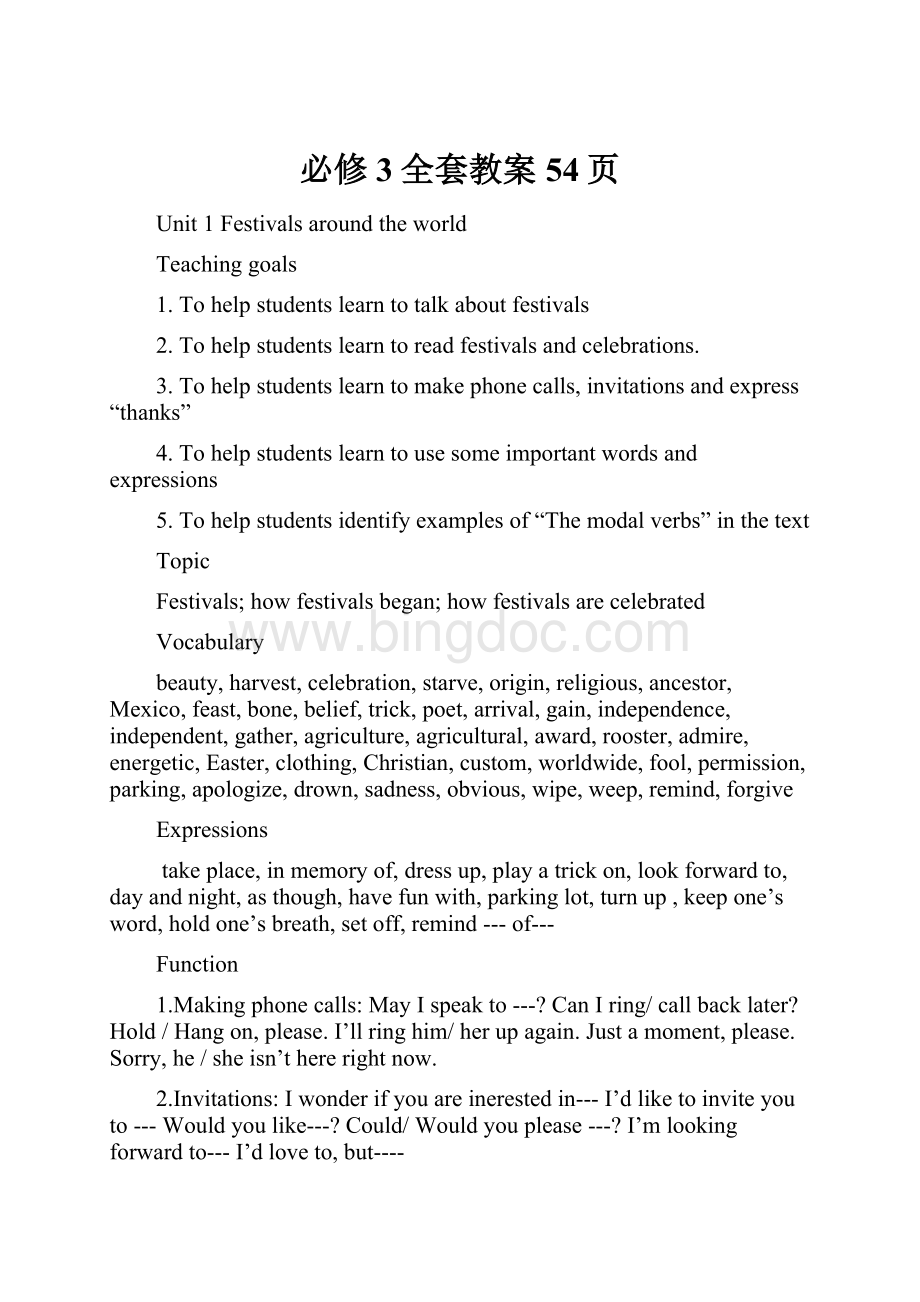必修3全套教案54页.docx
《必修3全套教案54页.docx》由会员分享,可在线阅读,更多相关《必修3全套教案54页.docx(98页珍藏版)》请在冰点文库上搜索。

必修3全套教案54页
Unit1Festivalsaroundtheworld
Teachinggoals
1.Tohelpstudentslearntotalkaboutfestivals
2.Tohelpstudentslearntoreadfestivalsandcelebrations.
3.Tohelpstudentslearntomakephonecalls,invitationsandexpress“thanks”
4.Tohelpstudentslearntousesomeimportantwordsandexpressions
5.Tohelpstudentsidentifyexamplesof“Themodalverbs”inthetext
Topic
Festivals;howfestivalsbegan;howfestivalsarecelebrated
Vocabulary
beauty,harvest,celebration,starve,origin,religious,ancestor,Mexico,feast,bone,belief,trick,poet,arrival,gain,independence,independent,gather,agriculture,agricultural,award,rooster,admire,energetic,Easter,clothing,Christian,custom,worldwide,fool,permission,parking,apologize,drown,sadness,obvious,wipe,weep,remind,forgive
Expressions
takeplace,inmemoryof,dressup,playatrickon,lookforwardto,dayandnight,asthough,havefunwith,parkinglot,turnup,keepone’sword,holdone’sbreath,setoff,remind---of---
Function
1.Makingphonecalls:
MayIspeakto---?
CanIring/callbacklater?
Hold/Hangon,please.I’llringhim/herupagain.Justamoment,please.Sorry,he/sheisn’thererightnow.
2.Invitations:
Iwonderifyouareinerestedin---I’dliketoinviteyouto---Wouldyoulike---?
Could/Wouldyouplease---?
I’mlookingforwardto---I’dloveto,but----
3.Thanks:
Thankyousomuch.Thanksalot.That’sverykindofyou.You’remostwelcome.Don’tmentionit.It’sapleasure.
Grammar
Themodalverbs(can,could,may,might,will,would,shall,should,must,can’t)
TeachingAids
Multimediafacilities,tape-recorder,photos,tape-recorder,photos,diagrams
PeriodOne
Procedure
Step1Warmingup
⑴WarmingupbyBrainstormingholidaysaroundtheworld.
⑵Warmingupbyguessingwhichpicturematcheswithwhichfestival.
⑶Warmingupbydiscussingandlisting
StudentsarerequiredtoworkingroupsandlistthreemoreChinesefestivalsthattheyknow.Discusswhentheytakeplace,whattheycelebrateandwhatpeopledoatthattime.Thentellthegroupwhichfestivalishis/herfavouriteandwhy.
Step2Pre-reading
Discussingandanswering
AskstudentstodiscussandanswerthetwoquestionsonP1
1)Itisintendedtohelpstudentsbringtheirpersonalexperienceintothediscussionoffestivals.
2)Studentsaredirectedtopredictthecontentofthereadingpassage,basedonthetitleandpictures.
Step3Reading
1.Skimming
AskstudentstoreadtheEx1onP3,havethemunderstandfourkindsoffestivals,andthenaskthemtoskimthereadingpassage.Afterreading,askthewholeclasstofillthefirstlineofthecharttogether.Thengetthemtofinishthechartbythemselves.Atlast,havethreestudentstelltheclasshis/heranswers.
2.Scanningforthedetailedinformation
1)AskstudentstoScanthepassageandfinishthetrueandfalseexercise.
1.Theancientpeopleneedn’tworryabouttheirfood.F
2.Halloweenusedtobeafestivalintendedtohonourthedead.T
3.QuYuanwasagreatpoetwhopeoplehonouralotinChina.T
4.Mid-autumnFestivalisheldtocelebratetheendofautumn.F
5.EastercelebratesthebirthofJesus.F
2)AskstudentstoscanthepassageagaintofindouttheanswerstothefirstthreequestionsoftheEx2onP3.Andthenaskonestudenttoanswerthequestionsandcheckwiththewholeclass.
Suggestedanswers:
1.Festivalsofthedeadareforhonouringorsatisfyingdeadancestersancestorsorothers,whosomepeoplebelievemightreturntohelporharmlivingpeople.
2.Auturnfestivalsarehappyeventsbecausepeoplearethankfulthatfoodisreadyforwinterandthehardfarmworkisfinished.
3.Atspringfestivals,peopleusuallyhavedances,carnivalsandotheractivitiestocelebratetheendofwinterandthecomingofspring.
3.Discussion(groupwork)
AskstudentstodiscussQuestion4and5inEx2onP3.
Question4
Beproudofourcustoms
Question5
Thesimilarities:
1TheChinese,JapaneseandMexicanfestivalsofthedeadallhavecustomstohonourthedead.
2TheChineseandJapanesegotocleantheirancestors’graves,andtheMexicansofferfood,flowersandgiftstothedead.
TheDifference:
TheMexicanseatspecialfoodthatlookslikebones,somethingtheChineseandJapanesedonotdo.
Step4.Postreading
1.Summarizeandfillinthechart
AncientFestivals
whytheendofthecoldwinter;plantinginspringandharvestinautumn
howlightfireandmakemusic
Festivalsofthedead
whytohonourthedeadorsatisfyandpleasetheancestors
howlightlamps,playmusic,eatfoodintheshapesofskullsandcakeswithbones,gototheirneighborstoaskforsweets,dressup
Festivalstohonourpeople
whyfortheirgreatcontributionstothesocietyorthecountry
howDragonboatracing,eatzongzi
HarvestFestivals
whyFoodisgatheredforthewinter.Aseasonofagriculturalworkisover.
howdecoratechurchesandtownhalls,gettogethertohavebigmeals,admirethemoonandeatmooncakes
SpringFestivals
whycelebratetheendofwinterandthecomingofspring
howeatdeliciousfood;haveexcitingcarnivals
2.Ex4onP3
Havestudentsdiscussinpairswhichkindsoffestivaltheythinkarethemostimportantandwhicharethemostfun.
PeriodTwo&PeriodThree
Languagefocus
1.bemeantto:
应该,得要,必须,应做
Youaremeanttoleaveatip.你得留下小费。
Ibelieveheismeanttobeasoldier. 我相信他天生是要当军人的。
IwasmeanttobeworkingonSunday,butIjustfooledaroundallday.
星期日我本应工作的,但却闲混了一整天。
辨析:
meandoing与meantodo
1)meandoing“意味着(必须要做某事或导致某种结果)”,其主语通常是指事物的词。
如:
Beingastudentmeansstudyinghard.作为一个学生,就意味着你要努力学习
Successmeansworkinghard.成功意味着工作努力。
2)meantodo“本意要做某事”,主语通常是表示人的名词或代词,其否定形式表示“无意做某事”,其过去完成式表示“本来打算做某事”
Whatdoyoumeantodowithit?
你打算把它怎样处理?
Wemeantocallonyoutomorrow.我们打算明天看望你。
Don'tbetoohardontheboy;hedidn'tmeantodoit.
"对这个小男孩不要太严厉了,他不是故意这么做的。
"
Breakingthevaseispurelyaccidental;shedoesnotmeantodoit.
打碎花瓶纯粹是偶然失手;她无意弄坏它。
I'msorryIhurtyou:
Ididn'tmeanto.
对不起,我弄伤了你;我不是故意的。
HehadmeanttoleaveonSunday,buthasstayedon.
他本来想星期天走的,但又留了下来。
2.celebratevt.
(1) 庆祝;祝贺
celebrateChristmas/one’sbirthday/avictory
(2) 赞扬;称颂
Thenamesofmanyheroesarecelebratedbythepoets.
词语辨析:
celebrate,congratulate
celebrate后常接日期,事情或场合
congratulate后常接人
表示为某事而祝贺某人congratulatesb.on/uponsth.
ex:
congratulateyouonyourmarriage.
有时还表示私自庆幸的意思。
ex:
Icongratulatedmyselfonmyescapefrombeingpunished.
3.takeplace/happen/occur/comeabout,breakout区别
英语中表示“发生”的词或短语均为不及物,不用于被动语态。
主语为所发生的事。
1)takeplace发生,举行;侧重安排或计划而发生的事,带有“非偶然”的意思
Theweddingwilltakeplacetomorrow.
In1919,theMay4thMovementtookplaceinChina.
但takeplace偶尔也可以用来表示偶然发生的事情。
如:
Theaccidenttookplaceonlyablockfromtheirhome.
事故发生的地方离他们家只有一个街区的距离。
2)happen“发生”,普通用词,含义很广。
常指具体客观事物或情况的发生,含有“偶然”的意味。
Whathashappenedtoher?
Ithappenedtorainthatday.
3)occur“发生,出现”,较正式用词,指事情偶然地、意外地发生或思想突然浮在心头。
当以具体事物、事件作主语时,happen和occur可以换用.
Thetrafficaccidentoccurred/happenedonWednesday.
Thatplanecrashoccurredonlyminutesaftertake-off.
空难在起飞几分钟后就发生了。
Didn'titoccurtoyouthathewaslying?
你当时没想到他在撒谎吗?
但当happen用作“碰巧”之意时,不能用occur代替,但可以与comeabout互换
4)comeabout“发生”,常指偶然发生的事情。
且很多时候与how连用。
与happen用法较接近
Howdidthiscomeabout?
这是怎么发生的?
Howdiditcomeaboutthatheknewwherewewere?
他是怎么知道我们在什麽地方的呢?
Howdoesitcomeaboutthatyouwerecaughtbythepolice?
5)breakout(火灾、战争、疾病)突然发生、爆发
TheSecondWorldWarbrokeoutin1939.
Hisfacebrokeoutinarash. 他的脸上突然长满了皮疹。
4.Mostancientfestivalswouldcelebratetheendofcoldweather,plantinginspringandharvestinautumn.
最古老的节日是庆祝寒冷季节的结束、春种和秋收。
would在句中表示过去经常做某事或者过去的某种习惯,是“常,有……的习惯”的意思。
如:
Hewouldlosethekeywhenevershewentoutalone.
他一个人出去时,总是把钥匙弄丢。
辨析:
would与usedto
1)两者都可用来表示过去经常性或习惯的动作,常常可以互换。
如:
Heusedto/wouldspendeverypennyheearnedonbooks.
过去,他通常把挣来的钱全花在买书上。
2)usedto表示过去经常性或习惯性的动作或状态现在已经结束,着重现在与过去的对比,would只能与表示动作的动词连用,不与表示状态和意识的动词连用;would表示有可能再发生。
如:
Peopleusedtobelievethattheearthwasflat.
过去人们总以为地球是扁平的。
(现在已经不再这样认为)
Hewouldgototheparkassoonashewasfree.
过去,他一有空就去公园。
(现在有可能还去)
5.Atthattimepeoplewouldstarveiffoodwasdifficulttofindespeciallyduringthecoldwintermonths.
在那个时代,如果食物难以找到,特别是在寒冷的冬季,人们就会挨饿。
1)starve:
sufferordiefromhunger(v.)
Millionsofpeoplestarvedtodeathduringthewar.战争中数百万人饿死了。
2)bestarvedof/starveforsth.;starvesbofsth:
longfor;beingreatneedof(使某人)得不到某事物而受苦或渴望获得某事物;缺乏
starvefornews渴望消息
She'slonely,andstarvingforcompanionship(friendship).
她很寂寞,渴望友谊。
Themotherlesschildrenwerestarvedof/werestarvingforlove.
失去母亲的孩子渴望得到爱。
3)感觉很饿。
tofeelveryhungry.仅用于进行时态。
如:
Whenwilldinnerbeready?
I’mstarving.
晚饭什么时候做好?
我快饿死了。
n.starvationdieofstarvation饿死
2)foodwasdifficulttofind的tofind为动词不定式,作状语,修饰表语形容词difficult,并且find与主语之间构成动宾关系,主动形式表示被动含义。
如:
Habitsareeasytomakebuthardtobreak.习惯养成容易戒掉难。
Thewaterisfittodrink.这水适合饮用。
修饰宾语补足语形容词时候也是一样的,如:
Ifoundthecarcomfortabletoridein.我觉得这种车很好坐。
Thatmakespoetrydifficulttowrite.那就使得诗很难写。
6.Somefestivalsareheldtohonourthedeadortosatisfytheancestors,whomightreturneithertohelportodoharm.
有些节日,是为了纪念死者,或者使祖先得到满足,因为祖先们有可能回到世上(给人们)提供帮助,也有可能带来危害。
句中的tohonourthedeadortosatisfytheancestors是不定式作目的状语。
后边跟了一个由who引导的非限制性定语从句,修饰ancestors。
a.honour
1)光荣,荣誉(n)
Theyfightforthehonourofthecountry.
Onemustshowhonourtoone’sparents.
2)inhonourof为了纪念
Afestivalissetinhonourofthehero.
3)anhonour光荣的人或事情
LiuXiangisanhonourtoourcountry.
4)尊敬,给以荣誉(v)
Childrenshouldhonourtheirparents.
b.satisfyvt.&vi.